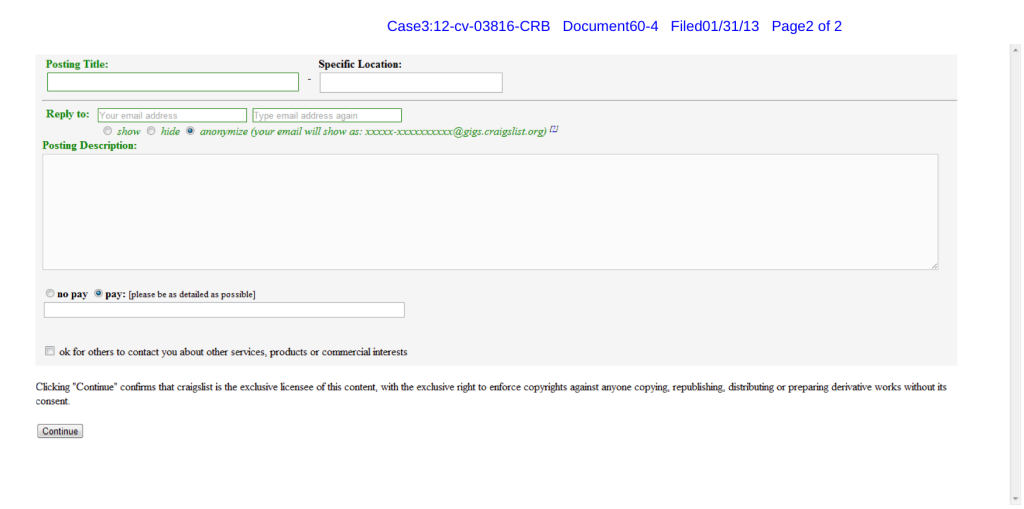For a two-week period of time, from July 16, 2012 through August 8, 2012, Craigslist presented users with the following statement when submitting a post:
Clicking “Continue” confirms that craigslist is the exclusive licensee of this content, with the exclusive right to enforce copyrights against anyone copying, republishing, distributing or preparing derivative works without its consent.
A screenshot of the page is below:

Copy of exhibit filed with the court here.
Four days after the statement was added, Craigslist sued various companies that were harvesting and reproducing Craigslist postings on a variety of claims, including copyright infringement. The defendants challenged whether Craigslist had a sufficient ownership interest in the copyright of the users’ posts to bring suit, namely, whether it indeed had an exclusive license to the posts submitted when this language was displayed.
A grant of exclusive rights to copyright must be in writing, but the Electronic Signatures in Global and National Commerce Act (“E-Sign”), 15 U.S.C. §§ 7001 et seq., allows for the electronic signature of documents. An e-signature will be “an electronic sound, symbol, or process, attached to or logically associated with a contract or other record and executed or adopted by a person with the intent to sign the record.” 15 U.S.C. § 7006(5). In light of the E-Sign Act in part, The Court of Appeals for the 11th Circuit held that it was “neither objective nor reasonable” to claim that a sequence of emails did NOT create a valid assignment of a copyright.
I’ve expressed skepticism in the past about whether an action should be considered an e-signature where the action taken has a different primary purpose (in the case linked above, the uploading of a file) and the supposed grant is not clearly stated. But as much as I disagree with the concept of granting Craigslist an exclusive license to a post, Craigslist couldn’t have been clearer that clicking “Continue” would effect the grant of an exclusive license.
Which is what the court found. So while I still highly doubt whether the person submitting the content realizes the legal significance of granting an exclusive license, Craigslist was required to do no more than it did.
But, Craigslist did not have an exclusive license to content submitted without the displayed language. The Terms of Use standing alone did not grant an exclusive license, largely because the agreement didn’t use the word “exclusive.”
Many other legal theories were covered in the decision, covered at:
EFF
Techcrunch
Forbes
Bloomberg
Ars Technica
Techdirt
Craigslist Inc. v. 3Taps Inc., No. CV 12-03816 CRB (N.D. Calif. April 29, 2013).

The text of this work is licensed under a Creative Commons Attribution-No Derivative Works 3.0 United States License.

Leave a Reply